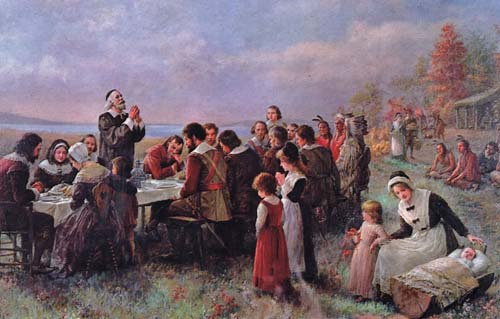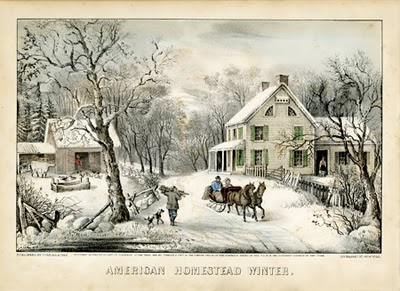Songs and Hymns
of Harvest and Thanksgiving

In the United States, most people think of the "First Thanksgiving" as the celebration at Plymouth, when the Pilgrims hosted a feast with the local Native Americans as their guests in 1621. However, though the Pilgrims were a very religious people and regularly expressed their thanks to God, the 1621 festivities were more in the tradition of a harvest festival than a religious occasion. The celebration was also a one-time event. The colonists did not intend to establish an annual holiday and there was no official "Thanksgiving proclamation." Two years later they held the first “religious” thanksgiving when they held a special church service to give thanks for a rain that ended a drought.
By the second half of the 17th century many communities were having annual days of thanksgiving, often including prayer and fasting, after the harvest. The first national day of Thanksgiving was proclaimed by George Washington in 1789, but thereafter, it was left to the governors of the various states and territories to proclaim days of Thanksgiving.
It was not until 1863, in the midst of the American Civil War that President Abraham Lincoln resumed the tradition of Thanksgiving proclamations. Since then, every American president has issued an annual Thanksgiving proclamation. Finally, in 1941, congress passed a bill naming the fourth Thursday in each November as Thanksgiving Day.
As a Texan, I must point out that there are claims that the “First Thanksgiving” in the New World was actually held in what is now El Paso, Texas. In 1598 Juan de Oñate, who had been granted land in the northern Rio Grande Valley, led an expedition of 500 people on a 50-day march across the Chihuahuan Desert. They endured many hardships and finally ran completely out of food and water 5 days from their destination, surviving by eating roots of desert vegetation. They arrived at the Rio Grande just in time to save them from all dying of thirst. Ten days later, having recuperated from their desperate journey, Oñate ordered a day of thanksgiving for the survival of the expedition. Included in the event was a feast, supplied with game by the Spaniards and with fish by the natives of the region. A mass was said by the Franciscan missionaries traveling with the expedition.
There are many Christian hymns of thanksgiving, some of which are associated with Thanksgiving Day, and we've provided the music for some of these below. As with the whole site, this is a work in progress and we'll be adding songs regularly, so check back often. If we've left out some of your favorites, please
contact us and we'll add them to our "To Do Soon!" list.
Also, since we do not have videos for most of the songs on this page, we'd be glad to have you provide them. Just post a video on Youtube and send us the information so we can link to it! We'll be thankful!
Tablature for these songs can be found by clicking on the link to each respective instrument, above left.
Come, Ye Thankful People, Come
Though many Americans associate "Come, Ye Thankful People, Come" with our Thanksgiving Day, it was actually written in 1844 by an Englishman, Henry Alford, to be used at harvest festivals in English villages. It was originally titled "After Harvest." The music was written by George Elvey in 1858.
Doxology
(Praise God From Whom All Blessings Flow)
The “Doxology” may well be the most frequently sung hymn of the last 300 years. It was written around 1674 by Thomas Ken, an Anglican bishop. Ken served for a time in the royal court of the Hague, Holland, as the English chaplain. However, because of his habit of boldly denouncing corruption in high places, he was forced to leave after a short time. He returned to England where he was appointed as one of King Charles’ chaplains. It was said of Ken by the historian Macaulay that “He came as near to the ideal of Christian perfection as human weakness permits.”
What is sung as the “Doxology” today is actually the final stanza of three hymns – “Morning Hymn,” “Evening Hymn,” and “Midnight Hymn.” Originally, the third line was “Praise Him above y’ Angelic Host,” Some have said that this simple song has done more to teach the doctrine of the Trinity than all the theological books ever written.
Now Thank We All Our God
During the Thirty Years’ War, Martin Rinkart was the only pastor in Eilenburg, a walled city in Saxony. The city was overrun by refugees who hoped to find safety inside the walls. Hunger and plagues racked the city, and in the year 1637 Rinkart conducted as many as forty or fifty funerals a day – nearly 5,000 in all, including one for his own wife. It was in the midst of these desperate conditions that he composed this hymn of thanksgiving to God.
Praise to God, Immortal Praise
Praise to the Lord, the Almighty
Joachim Neander of Bremen, Germany, was the son and grandson of Lutheran ministers. As a teen he rebelled against the faith, leading an ungodly life. At the age of twenty, he went to a meeting a visiting preacher was conducting in Bremen. Although his intent was to poke fun at the minister, God had other plans and Neander became a Christian. Although his life was brief (he died at age 30) he wrote over 60 hymns, this one written in the last year of his life.
Because he enjoyed exploring the caves of the Düssel River valley, near his home, one of them was named Neanderhöhle in his honor in the early 19th century and later, the area was called Neander Valley (in German, Neanderthal). In 1856 fossilized human remains were found there and "Neanderthal Man" immortalized Joachim's last name in a way hymnist could never have imagined!
We Gather Together
This anonymous hymn from the 16th century is another that we Americans tend to think of as our own. However, it is from Holland where it was originally sung to celebrate the Dutch victory over Spanish overlords, leading to freedom from Spanish control. Careful attention to the words make clear the references to historical events, though equally applicable to one's personal Christian life.
We Gather Together
We Plow the Fields and Scatter

Over the River and Through the Wood
Yes, I know this one isn’t a hymn, but it’s one of the songs most associated with Thanksgiving Day. Originally titled “A Boy’s Thanksgiving Day,” it was written in 1844 by Lydia Maria Child, based on her own childhood memories of visiting her
grandfather's house in Medford, Massachusetts.
"Over the River and Through the Wood"
Sheet Music
"Over the River and Through the Wood"
Guitar Tab
"Over the River and Through the Wood"
Mandolin Tab
"Over the River and Through the Wood"
Ukulele Tab
_____________________________________________________________
Home